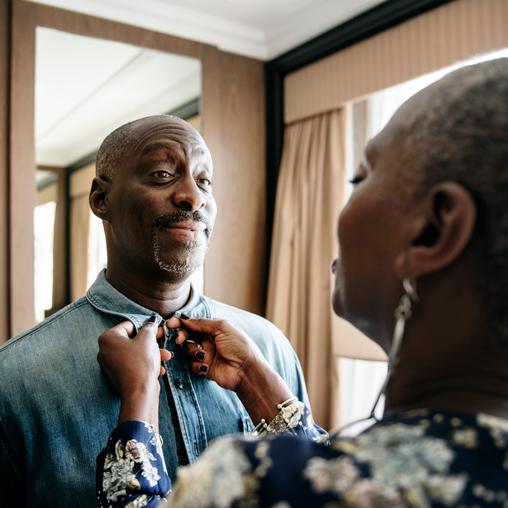
Why Love Is Kind
Does your spouse consider you a kind person? Author Bob Lepine talks about the characteristics that define love as described in 1 Corinthians 13, focusing on the virtue of kindness. A kind person, Lepine explains, is someone who actively seeks to bless another person. Consider the ways you could bless your spouse by proactively meeting their need or meeting their heart's desire. Practicing kindness in a marriage is the single greatest predictor of marital happiness and stability.
Show Notes
About the Host
About the Guest
-
- Learn more about the Love Like You Mean It video series with Bob Lepine. https://www.familylife.com/love-like-you-mean-it-study/
- Find resources from this podcast at https://shop.familylife.com/Products.aspx?categoryid=130.
- Download FamilyLife's new app! https://www.familylife.com/app/
- Check out all that's available on the FamilyLife Podcast Network. https://www.familylife.com/familylife-podcast-network/
- Have the FamilyLife Today® podcast and resources helped you? Consider becoming a Legacy Partner, a monthly supporter of FamilyLife. https://www.familylife.com/legacy
-
Dave and Ann Wilson
Dave and Ann Wilson are hosts of FamilyLife Today®, FamilyLife’s nationally-syndicated radio program. Dave and Ann have been married for more than 38 years and have spent the last 33 teaching and mentoring couples and parents across the country. They have been featured speakers at FamilyLife’s Weekend to Remember® marriage getaway since 1993 and have also hosted their own marriage conferences across the country. Cofounders of Kensington Church—a national, multicampus church that hosts more than 14,000 visitors every weekend—the Wilsons are the creative force behind DVD teaching series Rock Your Marriage and The Survival Guide To Parenting, as well as authors of the recently released book Vertical Marriage (Zondervan, 2019). Dave is a graduate of the International School of Theology, where he received a Master of Divinity degree. A Ball State University Hall of Fame quarterback, Dave served the Detroit Lions as chaplain for 33 years. Ann attended the University of Kentucky. She has been active alongside Dave in ministry as a speaker, writer, small-group leader, and mentor to countless wives of professional athletes. The Wilsons live in the Detroit area. They have three grown sons, CJ, Austin, and Cody, three daughters-in-law, and a growing number of grandchildren.
-

Bob Lepine
Bob Lepine is the Lead Pastor at Redeemer Community Church in Little Rock, Arkansas which he helped plant in 2008. He also serves on the Board of Directors for the Great Commission Collective, a church planting ministry connecting more than 150 churches world wide. Bob also hosts Mornings on Family Radio, a network of more than 70 radio stations in the US. He is also well known to radio and podcast listeners as the long-time co-host of FamilyLife Today® and as the on-air announcer for Truth...more
Bob Lepine talks about 1 Corinthians 13, focusing on the virtue of kindness. Bob says practicing kindness in a marriage is the single greatest predictor of marital happiness and stability.
Bob: This is FamilyLife Today for Monday, November 16th. Our hosts are Dave and Ann Wilson; I'm Bob Lepine. You can find us online at FamilyLifeToday.com. Kindness is an essential ingredient for a strong, healthy marriage. We’ll talk more about the importance of kindness today. Stay with us.
And welcome to FamilyLife Today. Thanks for joining us on the Monday edition. We are on a bit of a mission—we’ve said this before, here, at FamilyLife®—our goal is to effectively develop godly marriages and families. We believe godly marriages and families can change the world—
Dave: Yes.
Bob: —one home at a time, so everything we do—from this radio program to the resources we create—all that we do has that in mind.
I recently wrote a book called Love Like You Mean It that is for married couples, that takes 1 Corinthians 13 and says, “How would this/how would this flesh out in a marriage relationship?” I think a lot of couples today are thinking culturally about love instead of thinking biblically about love, so that’s the goal—to try to get us all thinking more biblically.
Ann: I think, Bob, if we’re not careful, we will just automatically drift toward the culture.
Bob: Yes.
Ann: We will drift toward the culture. I love that you wrote this book; I love that we’re producing more and more content to help couples not drift toward the culture’s view of love and marriage.
Dave: I’m shocked that no one’s ever written a book on the love chapter/on
1 Corinthians 13. Were you the very first one?—because it is the best. I think people, that don’t even read the Bible, when they hear it go, “Now, that’s a definition/description of love that’s real and true,” and “I don’t know if I’ve ever read that anywhere,”—
Bob: Yes.
Dave: —and there it is—it’s God’s Word.
Bob: I didn’t find anything about marriage that was looking at 1 Corinthians 13. There are people, who have taken that passage and have written about love in general; but I thought, “Let’s talk about marriage and how that gets lived out in a marriage relationship.”
Ann: We read that Scripture all the time at weddings.
Bob: Yes.
Ann: But it’s one thing to read it at the wedding and another thing to apply it in your marriage.
Bob: We have to keep in mind that, when the Apostle Paul wrote the definition of love in 1 Corinthians 13, he was/he was actually scolding the church for not being a loving church. The Corinthian church was puffed up and proud; and it was all about “our gifts” and “Look at how good we are.” He says none of that matters unless you have love.
Dave: Yes; he didn’t write it down and say, “Hey, look what I wrote. They’re going to read this at weddings!” [Laughter]
Ann:—or “…use this at Valentine’s Day”; yes.
Dave: I mean, it was a rebuke; and it said: “You want to know what God’s love is? This is what it looks like..” That’s not how most people love.
Bob: We want our listeners to hear just a portion of the video series. We talk, in this section, about one of the aspects of love from 1 Corinthians 13. Paul says love is kind. What does kindness look like in a marriage relationship?
[Love Like You Mean It® Excerpt]
Bob: Do you know what attribute of God is most often mentioned in the Old Testament? You might think that it’s God’s justice or His holiness that is the most often referred to attribute of God of the Old Testament; but more than 250 times, the word that is used to describe God, throughout the Old Testament, is the Hebrew word—and I’m not great on Hebrew—but it’s hesed. It’s a word that is translated “loving kindness.” In fact, singer, songwriter and Bible teacher, Michael Card, says this—he says, “The great surprise of the Hebrew Bible is not that God is awesome or holy,”—in fact, he goes on to say, “Other religions/their gods are awesome and holy; these are characteristics we would expect from God. The great surprise of the Hebrew Bible is that God is kind/that He is a God of hesed.”
In 1 Corinthians 13, one of the characteristics of love that is described for us—when we want to understand what real love looks like—one of the words that is used is the word, “kindness”—“Love is kind.” To be a loving person is to be a kind person. In other words, these two things fit together. You can’t be loving and unkind simultaneously. We’d never think of an unkind person as a loving person; these are inextricably linked with one another.
One writer says: “Kindness is a readiness to do good, to help, to relieve burdens, to be useful, to serve, to be tender, to be sympathetic toward others.” Someone else has said: “Kindness is love in work boots. A kind person is someone who seeks to actively, aggressively, lavishly bless another person.”
Rebekah: This is what we call our cheesecake story. Imagine it’s really late at night. I am huge pregnant with our very first child, and we were working really late. I was sitting in a metal folding chair, with my feet all swollen, very exhausted, nauseous. I became consumed with the thought of strawberry cheesecake; so much so that I started crying, and I couldn’t stop.
Rebekah’s husband: I feel like, in that moment, I had to be the man and help solve this situation for Rebekah. She knows, when she pulls the plug on the tears, it moves my heart. That just kicked things in motion that everything needed to stop, and she needed cheesecake.
Rebekah: He called everything quits. That’s where he put on his love and work clothes. He got me in the car, and we started driving; it was after 10:00 at night. We went to Fazzoli’s, because we knew they had strawberry cheesecake—went up to the door; it wasn’t open. Then went to another restaurant—went up to the door; it wasn’t open. So he drove over to Kroger; we went to the bakery and found the strawberry cheesecake. It was like the holy grail—
Rebekah’s husband: Aaah!—yes.
Rebekah:—right there. We were so excited—I mean, I was.
Rebekah’s husband: It took about 45 minutes to find that one piece of cheesecake.
Rebekah: Yes; what was better for me was seeing that he was willing to stop everything, and get in the car, and go from place to place to place for such a long period of time, just to make sure that that little desire that I had was something that he could meet.
Bob: Does that describe you in your relationship with your spouse? Are you somebody who seeks to actively, aggressively, lavishly bless your spouse? That’s what kindness is. I really think there are three elements to kindness. It has to begin with a right attitude toward our spouse; and then kindness is going to manifest itself, secondly, in how we speak to one another—coming out of our right attitudes, our speech will emerge—and then, third, it’s our actions toward one another.
Let’s break that down: our attitude, our speech, and our actions and what kindness should look like in a marriage. Our attitude first. When kindness dominates a marriage relationship, a spouse is always thinking, “My goal is your good. I want to—as a goal of my life—to see you thrive and prosper,” and “I want you to be the person God created you to be. I want to see you flourishing in this life—that’s my goal.” That’s how kindness manifests itself—that’s our attitude. It starts with this idea: “Even if it costs me something, I want this so much I’m ready to pay the price. I’m ready to do what this costs me.”
When you start with that attitude, then the next thing is: “Do your words reflect that that’s what’s in your heart? Are the words you’re speaking to one another words of kindness?” / “Even if it costs me, that’s okay; because I’m committed to your good.”
Think about God’s kindness toward us: God’s kindness is manifest in the fact that He is committed to our thriving, even if it costs Him—and it did—it cost Him His Son for us to be reconciled to Him and for us to be the people that He wants us to be. That’s an evidence of God’s good kindness toward us—that’s the attitude of our heart—that’s where it’s got to begin. And it’s out of the abundance of the heart that your mouth speaks. It’s got to start in the heart, but then it should show up in the words we’re using with one another.
Wife 1: Just the way that he pushes me and supports me in whatever area. The things that I can’t see in myself—it’s almost like God has given him the ability to see it in me, so he pulls that out of me.
Husband 2: She told me the other day she was my number-one fan.
Wife 2: Yes; I am.
Wife 3: I have been trying to make healthier decisions. For my husband to kind of look at me and go, “I’m proud of you for just being—for to press through this and being disciplined in this area,”—like, “I’m proud of you,”—that was big.
Husband 3: Yes; because I was eating ribs—
Wife 3: —and I wasn’t. [Laughter]
Ronnie: I don’t know. [Laughter] She’s a very encouraging person, but I can’t think anything—
Sabrina: He’s not a words person; words is not his love language.
Husband 4: No; I’m not a word person. [Laughter]
Husband 5: Great sex for me—that’s very encouraging—
Wife 5: Oh my gosh.
Husband 5: —really good sex. That’s how I get really encouraged. [Laughter]
Wife 5: Is that really what you wanted to say?
Husband 5: It’s—I’m honestly encouraged; I am thoroughly encouraged.
Wife 5: They’re not going to use that one.
Husband 5: They will.
Wife 6: He does a lot of little things like breakfast in bed on weekends. When I’m going to the office, he literally walks me to the door; and he stands at the door until I’m pulled away in the car and he blows me kisses. He’ll call me throughout the dayor text me to let me know he’s thinking about me. I would say that he makes me feel cherished and loved—deeply loved.
Wife 5: Say something that they can use.
Husband 5: It’s honest.
Wife 5: Say something they can use.
Husband 5: “Great sex.”
Wife 5: Okay.
Wife 7: I feel like he points me back to: “Your purposes is in who you are in Christ and what are you doing for Him.” He reminds me of that; because like every couple months, I forget that. [Laughter]
Husband 8: She’s allowed me to be the head, even when I wasn’t deserving; you know? That means a lot. Even/even when I may have not made the best decision, but she still honored me as the husband.
[Studio]
Bob: We’ve been listening to a portion of the Love Like You Mean It video series, which is just now available from us, here, at FamilyLife—ten sessions for couples to go through on what real love looks like in a marriage relationship.
To hear those couples describe the things we do for one another that make us feel cherished—they’re acts of kindness.
Ann: I’m so glad you included a lot of different couples. I mean, I listen to some of those, thinking, “Oh! I wish Dave would do that.” [Laughter]
Dave: I knew that’s what she was thinking! [Laughter] I was sitting there, like, “Just stop it! Stop it right now,”—no. [Laughter] At the same time, I’m listening to the same thing, thinking, “I need to step up.” It’s inspiring to see couples like us—and funny ones too—
Bob: Yes.
Dave: —that one guy was pretty funny—but it inspires you to say, “Okay; it’s one thing to say love is kind; it’s another thing to do it.”
Bob: Yes.
Dave: That’s what we’re called to do.
Bob: Here’s the thing—we don’t recognize how powerful small acts of kindness, throughout the day—in a marriage, these are the bonding agents for a marriage relationship. When that’s absent, we feel it; when it’s present, it just pulls us together.
Ann: That’s so true. I think many times we think it’s that extravagant act of love; but really is the little things of saying: “Thank you,” or “I notice this…” or just something small—of walking your spouse to the door.
Bob: Yes. As we’ve said in the series, it has to start with a heart that is really inclined toward kindness. We’re not just looking for a change in behavior; you want this to be a predisposition of your heart, where you/you want to be kind toward another person for Christ’s sake. But it can’t just stop with wanting to be kind, it has to show up; that’s what we’re going to hear as we listen to another segment from the Love Like You Mean It video series.
[Love Like You Mean It Excerpt]
Bob: When it comes to kindness, it’s not just the thought that counts; I mean, we say that all the time; right?—“Well, it’s the thought that counts.” Kind thoughts are fine; but if they don’t manifest themselves in kind words and kind actions, then what good are your kind thoughts?
The Book of Proverbs says this—it says: “Life and death are in the power of the tongue.” I mean, think about that. The words we speak to one another, whether they are kind or unkind, are words that either give life to another person—causing that person to thrive, and to blossom, and to flourish—or they’re words that can sap the life out of another person, causing them to shrink back and to decay. Your words of kindness are words that will either give life to your spouse or speak death to your spouse.
Again, it’s got to start from the heart; you can’t just dress up an unkind heart with flattering words; no. But if your heart is predisposed toward kindness, then we should be seeing in you a manifestation of kindness in how you speak to one another. Saying unkind things to one another in a marriage will never cause your love for one another to grow; it won’t cause your marriage to thrive. We have to guard our hearts and our tongues—and seek to speak words that are positive, and encouraging, and uplifting—words of kindness/words that bring life to another person.
Kindness begins as an attitude and then it shows up in kind words; and then ultimately, it’s going to manifest itself in kind actions, where we’re seeking to do things that—that benefit another person/that cause them to thrive.
Now, there’s a difference between somebody who’s nice and somebody who’s kind; right? If I introduced you to two people—I said, “This guy’s a really nice guy,” and then I said, “This person is a really kind person,”—you’d understand the difference. We like nice people—better to have nice people than mean people—but you’d really rather have somebody who’s kind than just somebody who’s nice. When we talk about actions toward one another, we’re not just talking about politeness or proper etiquette; we’re talking about actions that actively seek to bless another person.
Here’s a good question for all of us: “Would your spouse describe you to others as somebody who’s kind?” If they were in casual conversation and they said, “Tell me about your husband,” or “…about your wife,”—would your spouse say, “Oh, she is so kind; I’ve never known anybody who was a kinder person”? Wouldn’t you like to be thought of as somebody who’s a kind person? That’s going to require intentionality; it requires a decision to want to proactively seek to bless another person.
Mary Ann and I were attending a marriage conference as attendees a number of years ago. The speaker, who was speaking, shared a story about how his wife had told him that she really loves it when he fills up her car with gas. He just makes sure that there’s always gas in her tank. I remember looking over at Mary Ann and saying, “Would you like me to do that?” and she was/she smiled; she nodded. Since that time, I’ve made it a quest/it’s my goal to make sure that my wife rarely has to fill up her own gas tank; I keep her car well supplied. She sees that as a demonstration of my proactive love for her; it’s an act of service; it’s kindness being manifested toward her.
She does that for me in dozens of ways; every time I open a drawer, and there are clean undershirts in my drawer, those didn’t just magically appear there; it’s because my wife chose to be kind to me.
As we serve one another in little ways in our marriage, those little ways are little deposits of proactive kindness toward one another. It’s easy to take those things for granted. It’s easy for us to overlook those, or expect those, or say, “Well, yes; that’s what you should do.” We need to pull back and say, when we’re doing that for one another, it’s coming out of a heart that says, “I really care about you thriving, and I’m here to support that/I’m here to help make that happen. I’m here to do my part to be kind toward you.”
All of these things may seem like small things—little tiny deposits of kindness—but researchers have found, over the years, that the presence of kindness/acts of kindness in a marriage, is one of the best long-term predictors of marital success. Couples, who are thriving and who experience high levels of marital satisfaction, are couples who experience these kinds of acts of kindness happening in their marriage regularly. Again, it has to start with intentionality in our heart. We have to be purposeful in wanting to bless our spouse, and then it shows up in our words and how we speak to one another; ultimately, in the acts of kindness we do to serve one another in marriage.
Love is kind; are you kind?
Sabrina: One night, when we were having one of these big fights, we were just having one of these days, where I really thought, “We’ve made a mistake; we shouldn’t have gotten married.” Our families weren’t getting along; kids weren’t happy. He didn’t seem to be happy with me, and I felt completely like a failure. I felt like: “We’ve messed up, and there’s no way we can fix it,” and “We’re just going to have to live in sorrow, and sadness, and pity forever.”
I was talking to Robbie, and I was being honest with him. I said, “I’m just struggling/I’m just really struggling; and I’m not sure if we did the right thing or not.” He looked at me and—do you remember what you said to me?
Robbie: “You are God’s perfect gift to me.”
Sabrina: [Emotion in voice] Yes; that’s what he said. When he could have chosen to be vindictive, and reminded me of all the things I’ve done wrong, or how I could have made it better, he chose to be kind instead. That was a really powerful moment.
[Studio]
Bob: Kindness makes a difference in a marriage relationship.
Dave: Well, you got me crying.
Ann: Me, too; that was really powerful.
Dave: That was/that was beautiful. I did have this thought: “It’s so easy to want kindness from your spouse.”
Bob: Yes.
Dave: I’m guessing some people watch that and say, “My husband would never say that.” It’s/you’ve got to look in the mirror and say—it’s the way you ended the session, Bob—“Are you kind?” That’s only possible through the power of the Holy Spirit of God in us.
Ann: Yes; because of our sin bent, our first response, naturally, is, “You’re not doing that for me.”
Bob: Yes.
Ann: And yet, with the Holy Spirit power of God living within us, we can think, “No; I can do that for my spouse, regardless of what happens in return.”
Bob: That’s a big part of this series—the Love Like You Mean It video series—is to say: “Each of these attributes of love is not something we conjure up; it is a Holy Spirit-generated fruit of the Spirit. Patience comes when the Holy Spirit brings that out of you. Kindness comes”—again, patience and kindness are two of the fruit of the Spirit found in Galatians 5. Here in 1 Corinthians 13, Paul says, “This is what love looks like: love is patient; love is kind…”
Our hope is that couples will get together with other couples and spend time talking about these qualities of love so that we can all do a better job of living this out in our marriage relationship. The new Love Like You Mean It video series is now available for pre-order. Find out more when you go to FamilyLifeToday.com, or call 1-800-FL-TODAY for more information about the new Love Like You Mean It video series from FamilyLife. Again, check out some of the other video series we have, here, at FamilyLife—like the Art of Marriage® or Dave and Ann Wilson’s Vertical Marriage® video series.
Here, at FamilyLife, we’re committed to doing all we can do to provide you with practical biblical resources, video series, articles, podcasts, this daily program—all that we do is designed to help equip you to have a stronger, more durable marriage and a stronger family. FamilyLife Today exists to effectively develop godly marriages and families, who change the world, one home at a time. I want to say, “Thank you,” to our Legacy Partners. You guys really—the Legacy Partners are the glue—they have made it possible for all of us to benefit from what we’ve heard today, so thank you so much.
Those of you, who contribute from time to time, “Thank you,” as well. Your donations are having an impact in the lives of hundreds of thousands of marriages and families every day. It’s a great investment, and we’re thankful for your partnership with us, here in the ministry of FamilyLife Today.
If you’re a regular listener and you’ve never made a donation—or if it’s been a while—this would be a great time for you to say: “We want to stand with you. We believe in what you’re doing, and we want to help support the ministry of FamilyLife Today.” You can donate, online, at FamilyLifeToday.com; or call to donate: 1-800-358-6329—that’s 1-800-“F” as in family, “L” as in life, and then the word, “TODAY.”
Tomorrow, we’re going to talk about how important honesty and truthfulness is in a marriage. The Bible says: “Love rejoices in the truth,” and we’ll examine what that means tomorrow. I hope you can be with us for that.
I want to thank our engineer today, Keith Lynch, along with our entire broadcast production team. On behalf of our hosts, Dave and Ann Wilson, I’m Bob Lepine. We will see you back next time for another edition of FamilyLife Today.
FamilyLife Today is a production of FamilyLife of Little Rock, Arkansas; a Cru® Ministry. Help for today. Hope for tomorrow.
We are so happy to provide these transcripts to you. However, there is a cost to produce them for our website. If you’ve benefited from the broadcast transcripts, would you consider donating today to help defray the costs?
Copyright © 2020 FamilyLife. All rights reserved.
1





